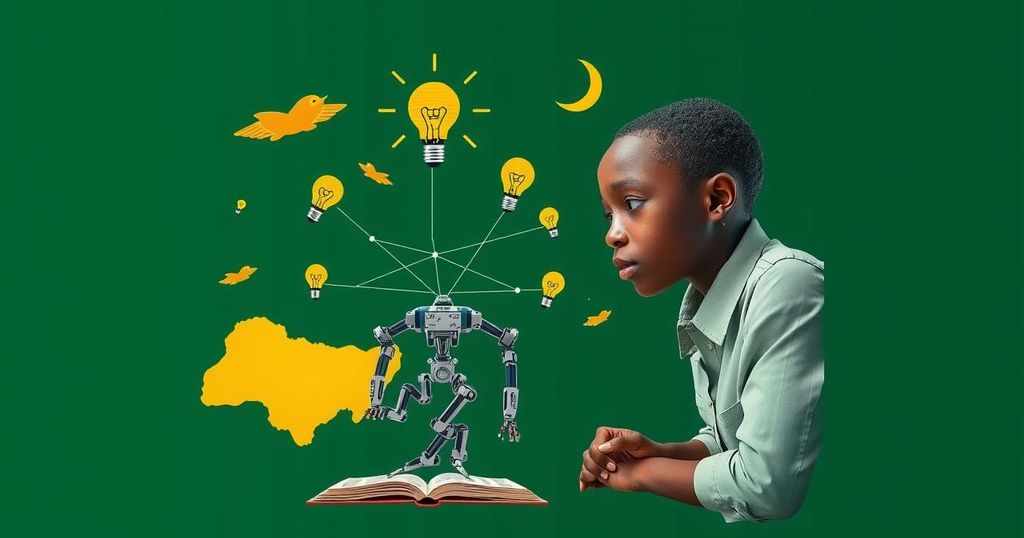Revolutionizing Nigerian Education: The Promise of Artificial Intelligence
Artificial intelligence has the potential to transform Nigerian education by personalizing learning experiences, addressing resource disparities, and enhancing access to quality education. AI tools can offer tailored learning insights, automate tedious tasks for educators, and provide advanced educational resources via mobile technology. However, safeguarding student privacy and ensuring ethical use of data remain paramount as Nigeria embraces this transformative technology.
Artificial intelligence (AI) is a transformative agent, poised to revolutionize education in Nigeria, echoing trends seen in developed nations. With challenges such as overcrowded classrooms, inadequate resources, and lack of access to quality education, AI provides a golden opportunity to democratize learning. Imagine a classroom where individual learning paths are crafted by AI tools that adjust to the strengths and weaknesses of every student—a place where a child struggling with math sees personalized exercises aimed at building their skills, not just academic rote learning.
In the U.S., I experienced firsthand how AI tools like LexisNexis altered the educational landscape by facilitating tailored legal research. These platforms enhanced my academic journey, providing immediate access to relevant statutes and legal commentary, akin to having an astute mentor by your side, guiding you through complex information seamlessly. This transformative power inspires a vision for Nigeria’s education, where prospective lawyers can access data-driven insights, merging technology and legal knowledge to empower future generations.
Yet, amid this technological surge, pressing concerns about student privacy loom. In Nigeria, the introduction of AI into the educational framework must prioritize safeguards that uphold trust. Institutions need to adopt robust protocols for data collection, ensuring compliance with international privacy standards, like the General Data Protection Regulation (GDPR). By ensuring minimal data collection and maintaining transparency, we can empower students while fostering a climate of respect for personal information.
Mobile penetration in Nigeria, nearing 50%, presents a unique opportunity to utilize mobile applications as educational tools. These AI-powered apps can transcend the barriers faced by students in remote areas, offering interactive lessons and resources directly through smartphones. Picture a child in rural Nigeria having the world’s knowledge base available at their fingertips, learning at their own pace and exploring subjects like a digital explorer in an endless library.
The vision of equitable education for every Nigerian child is within reach. With advances in technology and a commitment to ethical practices, we can harness AI to provide teaching materials that cater to the culturally diverse landscape of Nigeria. As we support tech startups to innovate local solutions, like personalized learning platforms through initiatives such as Dtechlawguide, the dream of access to world-class education transforms into an actionable reality.
To bring this vision to life, collaboration between stakeholders is essential. Policymakers, educators, and tech innovators must work hand in hand to create resources that enable a powerful learning experience. Imagine a future where every Nigerian child, regardless of urban or rural setting, has access to top-tier educational resources that foster success and innovation. The time to act is now—let us harness the burgeoning potentials of AI to illuminate the paths of knowledge for all.
AI is reshaping education globally, particularly in technologically advanced countries where it personalizes learning, improves administration, and enhances student performance. Nigeria faces a unique educational crisis characterized by large classes, inadequate infrastructure, and significant disparities in access to resources. AI emerges as a beacon of hope that can level educational opportunities, making quality learning accessible to all students, regardless of their socio-economic status. Harnessing this technology effectively while prioritizing student privacy and ethical considerations could lead to remarkable improvements in Nigeria’s educational landscape.
In conclusion, the potential of artificial intelligence to revolutionize Nigerian education is immense, providing personalized learning experiences, bridging resource gaps, and ensuring that no student is left behind. Emphasizing strong privacy measures while implementing AI in education is crucial for building trust among users. By leveraging mobile technologies and fostering collaborations among stakeholders, Nigeria can truly unlock a future where quality education is a right for every child, fueling growth, innovation, and equity across the nation.
Original Source: punchng.com




Post Comment